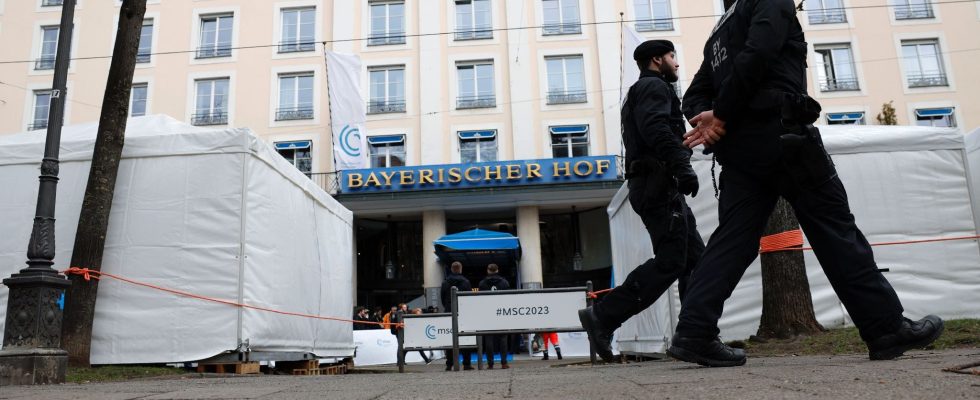Nicknamed the “Davos of Defense”, the 60th Munich Security Conference (MSC), which brings together the geopolitical elite, is being held in southern Germany from this Friday the 16th until Sunday February 18. Around fifty heads of state or government and around a hundred ministers from the four corners of the world will be present. Among the main themes discussed, the war in Ukraine and the conflict between Israel and Hamas in the Gaza Strip should be at the heart of the discussions.
Antony Blinken, the head of American diplomacy, and Vice-President Kamala Harris will represent the United States there. Emmanuel Macron will also be present alongside German and Polish leaders Olaf Scholz and Donald Tusk, as well as the President of the European Commission, Ursula von der Leyen, indicates the geopolitics review The Great Continent. Israeli President Isaac Herzog confirmed his presence as did the Prime Minister of the Palestinian Authority, Mohammad Chtayyeh. Russia and Iran were not invited, according to the same source.
This 60th conference is being held in a context of increasing global geopolitical and economic tensions, and at a time when the trend is for nation states to withdraw into their own interests, to the detriment of international cooperation. In its 2024 global security report, the MSC thus notes that “many governments no longer focus on the absolute benefits of global cooperation, but are increasingly afraid of reaping fewer benefits than others”. This is particularly true for developing countries which consider that “the international order has never kept its promise to increase the pie for the benefit of all”, analyzes the MSC.
The war in Ukraine at the heart of the discussions
The conference is being held a few days before the two-year anniversary of the Russian invasion of Ukraine. While the situation on the battlefield is “extremely complex”, according to the new commander-in-chief of the Ukrainian army, maintaining mobilization and support from allies is a priority for kyiv. Volodymyr Zelensky will be present on Saturday February 17 at this conference, after a mini-diplomatic tour to Paris and Berlin to sign bilateral security agreements.
The future of the Gaza Strip at stake
More than four months after the start of the Israeli offensive in the Gaza Strip, launched in reaction to Hamas attacks on October 7, the humanitarian situation is worsening day by day on the ground. Israel, which continues its military offensive, threatens to invade Rafah, where nearly 1.5 million Palestinians are refugees. According to Washington PostU.S. and Arab officials are working toward a truce deal.
This plan, which would provide for a ceasefire “with an expected duration of at least six weeks”, the release of Israeli hostages, as well as a timetable for the eventual establishment of a Palestinian state, could make the subject of discussions during the Conference, according to the American daily. The authors of the MSC report on global security worry that this war has disrupted “the regional rapprochement that had been gaining momentum” between Israel and Arab countries. They also point to the emergence of Iran as a threat to the G7 countries.
Renewed tensions between China and the United States
The Indo-Pacific region is also the subject of fears from these observers, who see the possibility of an escalation of violence in the region marked by opposition between China on the one hand, and Taiwan and its ally American on the other hand. Other less publicized conflicts will also be on the conference agenda, such as that in Sudan, which has displaced nearly 8 million people. The organizers are also worried about the instability in the Sahel, a region marked in recent years by a series of coups d’état.
As a result of this global instability, “capital flows and trade flows are beginning to fragment” along geopolitical lines, the report analyzes. In addition to economic cooperation, cooperation in environmental matters also seems threatened and relegated to the background: “the deployment of green technologies and progress towards carbon neutrality could be thwarted by tensions between China and the United States” and on “transatlantic disagreements over trade and subsidy rules”.
Cooperation with Southern countries
The organizers of the Munich Security Conference therefore recommend continuing to “build stronger partnerships with the countries of the South and jointly reform the existing order so that it benefits a much broader global community”. But they recognize that this task is difficult to carry out, particularly in this electoral year marked by the popularity of political parties and representatives opposed to multilateralism – starting with Donald Trump in the United States, although the latter is not explicitly named.
Created in 1963 in Munich, this summit originally brought together Germany and its NATO allies in a restricted framework, marked by the Cold War. Before gradually expanding to participants from Central and Eastern European countries, as well as the Russian Federation. Today, the Conference also welcomes Chinese, Brazilian and Indian representatives. In addition to political leaders, economic decision-makers and representatives of global civil society are participating in these discussions.
